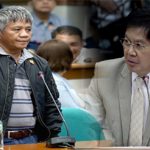United Nations (UN) High Commissioner for Human Rights Zeid Ra’ad Al Hussein scored leaders and singled out Philippine President Rodrigo Duterte for speaking against human rights institutions and investigations.
At the 33rd session of the Human Rights Council on September 13, Al Hussein hit Duterte for the president’s earlier remarks against the UN and the alleged human rights violations linked to his war against drugs.
“The President of the Philippines’ statements of scorn for international human rights law display a striking lack of understanding of our human rights institutions and the principles which keep societies safe,” he said.
“Fair and impartial rule of law is the foundation of public confidence and security. Empowering police forces to shoot and kill any individual whom they claim to suspect of drug crimes, with or without evidence, undermines justice. The people of the Philippines have a right to judicial institutions that are impartial, and operate under due process guarantees; and they have a right to a police force that serves justice,” he added.
Al Hussein encouraged the Philippines to invite the UN Special Rapporteur on extrajudicial, summary or arbitrary executions amid the rising death toll related to the campaign against drugs.
He also offered assistance if the Philippines need help in preventing and treating drug users.
“My Office is ready to assist, including with respect to rule of law institutions and the prevention and treatment of drug use in accordance with international norms,” he said.
Duterte’s earlier remarks on UN
After UN Secretary-General Ban Ki-moon condemned Duterte’s “apparent endorsement” of killings, Duterte hit back at the international organization, calling it “stupid” and “inutile.” He even threatened to take the Philippines out of UN.
Since Duterte assumed office on June 30, Inquirer reported that over 3,000 people have been killed in the campaign against drugs. This is part of Duterte’s campaign promise to eradicate crime and drugs within six months of his presidency.
Duterte once urged law enforcers and even armed civilians to shoot drug suspects who would resist arrest. He also offered bounties and vowed to give signed pardons to “honest” police officers who will be prosecuted for killing drug suspects.
[ads1]
PH gov’t responds
Philippine Permanent Representative to the UN Cecilia Rebong denied that Duterte ever gave shoot-to-kill orders to police in his desire to curb drugs.
She explained that Duterte only ordered the law enforcers to defend themselves when their lives are at stake as the suspects resist arrest.
Rebong emphasized that Duterte’s war on drugs has received “overwhelming support” from the Filipino people.
She added that the government’s campaign against drugs is “being waged under the leadership and direction of President Duterte, with a firm adherence to the rule of law, due process and human rights principles.”
Malacañang also released a statement on Wednesday noting that Duterte respected human rights but did not want these rights to be used in the proliferation of illegal drugs in the country.
“President Duterte is a respecter of human rights, but he has also been firm in saying that human rights cannot be used as an excuse to let the spread of drugs in the country run rampant,” said presidential spokesperson Ernesto Abella.
He added that as a lawyer and a former prosecutor, Duterte knows the limits of his power and authority of his position, emphasizing that the president follows due process.
Abella also quoted a part of Duterte’s first inauguration speech when he said: “I know what is legal and what is not. My adherence to due process and the rule of law is uncompromising.”
“[Extrajudicial killings] are not the policy of this administration,” Abella said.
According to the Philippine National Police records, 1,506 drug suspects have been killed in police operations from July 1 to September 14. During the same period, 1,571 people have been killed by suspected vigilantes and have been categorized as “deaths under investigation” by the PNP.
The Inquirer reported that 303 cases of killings have been filed. 190 suspects had been arrested while 113 remained at large, according to the PNP.
The police has arrested 16,891 drug users, while 659,868 people turned themselves in to the authorities. 52,862 alleged drug peddlers have also surrendered.
Aside from the Philippines, Al Hussein also hit other countries that refused human rights investigations, including Syria, Congo, Turkey, Venezuela, Pakistan, India, Ethiopia, Gambia, Mozambique, Abkhazia, Crimea, Nagorno-Karabakh, South Ossetia, Armenia, Nepal, China, Burundi, Dominican Republic, Iran, United States, Uzbekistan, Belarus, Democratic People’s Republic of Korea, Eritrea, Yemen, and Israel.
Sources: (globalnation.inquirer.net, newsinfo.inquirer.net, gmanetwork.com, cnnphilippines.com)
[ads3]


